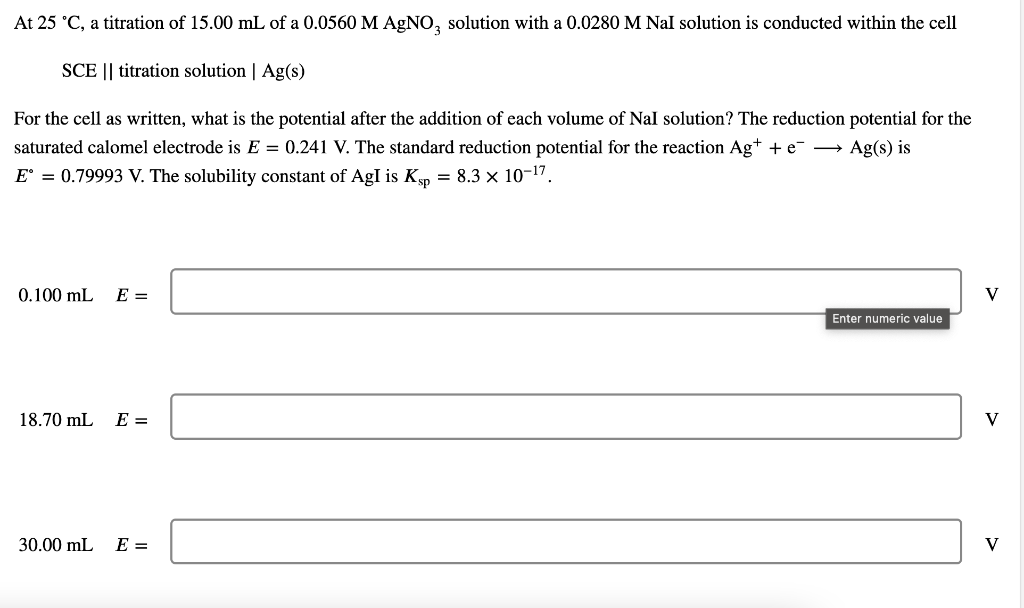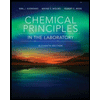At 25 °C, a titration of 15.00 mL of a 0.0560 M AgNO3 solution with a 0.0280 M Nal solution is conducted within the cell SCE || titration solution | Ag(s) For the cell as written, what is the potential after the addition of each volume of Nal solution? The reduction potential for the saturated calomel electrode is E = 0.241 V. The standard reduction potential for the reaction Ag+ + e¯ →→→ Ag(s) is E° = 0.79993 V. The solubility constant of AgI is Kp = 8.3 × 10-¹7. 0.100 mL E = 18.70 mL E = 30.00 mL E = Enter numeric value V V V
At 25 °C, a titration of 15.00 mL of a 0.0560 M AgNO3 solution with a 0.0280 M Nal solution is conducted within the cell SCE || titration solution | Ag(s) For the cell as written, what is the potential after the addition of each volume of Nal solution? The reduction potential for the saturated calomel electrode is E = 0.241 V. The standard reduction potential for the reaction Ag+ + e¯ →→→ Ag(s) is E° = 0.79993 V. The solubility constant of AgI is Kp = 8.3 × 10-¹7. 0.100 mL E = 18.70 mL E = 30.00 mL E = Enter numeric value V V V
Chemistry: The Molecular Science
5th Edition
ISBN:9781285199047
Author:John W. Moore, Conrad L. Stanitski
Publisher:John W. Moore, Conrad L. Stanitski
Chapter17: Electrochemistry And Its Applications
Section: Chapter Questions
Problem 92QRT
Related questions
Question

Transcribed Image Text:At 25 °C, a titration of 15.00 mL of a 0.0560 M AgNO3 solution with a 0.0280 M Nal solution is conducted within the cell
SCE || titration solution | Ag(s)
For the cell as written, what is the potential after the addition of each volume of Nal solution? The reduction potential for the
saturated calomel electrode is E = 0.241 V. The standard reduction potential for the reaction Ag+ + e Ag(s) is
E = 0.79993 V. The solubility constant of AgI is Kp = 8.3 × 10-¹7.
0.100 mL E =
18.70 mL
E =
30.00 mL E =
Enter numeric value
V
V
V
Expert Solution
This question has been solved!
Explore an expertly crafted, step-by-step solution for a thorough understanding of key concepts.
This is a popular solution!
Trending now
This is a popular solution!
Step by step
Solved in 3 steps with 3 images

Knowledge Booster
Learn more about
Need a deep-dive on the concept behind this application? Look no further. Learn more about this topic, chemistry and related others by exploring similar questions and additional content below.Recommended textbooks for you

Chemistry: The Molecular Science
Chemistry
ISBN:
9781285199047
Author:
John W. Moore, Conrad L. Stanitski
Publisher:
Cengage Learning

Chemical Principles in the Laboratory
Chemistry
ISBN:
9781305264434
Author:
Emil Slowinski, Wayne C. Wolsey, Robert Rossi
Publisher:
Brooks Cole

Chemistry: An Atoms First Approach
Chemistry
ISBN:
9781305079243
Author:
Steven S. Zumdahl, Susan A. Zumdahl
Publisher:
Cengage Learning

Chemistry: The Molecular Science
Chemistry
ISBN:
9781285199047
Author:
John W. Moore, Conrad L. Stanitski
Publisher:
Cengage Learning

Chemical Principles in the Laboratory
Chemistry
ISBN:
9781305264434
Author:
Emil Slowinski, Wayne C. Wolsey, Robert Rossi
Publisher:
Brooks Cole

Chemistry: An Atoms First Approach
Chemistry
ISBN:
9781305079243
Author:
Steven S. Zumdahl, Susan A. Zumdahl
Publisher:
Cengage Learning


Chemistry
Chemistry
ISBN:
9781305957404
Author:
Steven S. Zumdahl, Susan A. Zumdahl, Donald J. DeCoste
Publisher:
Cengage Learning
